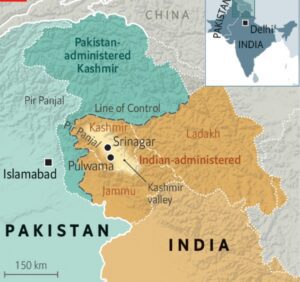The recent wave of protests in Pakistan-administered Kashmir (PoK) has spotlighted simmering economic grievances and societal discontent, manifesting in demands for fairer electricity tariffs, reduced wheat flour prices, and an end to elite privileges. Led by the Jammu Kashmir Joint Awami Action Committee (JAAC), these demonstrations reflect broader socioeconomic challenges facing the region and the complexities of governance in a politically sensitive territory.
The “Long March” and Escalating Tensions:
Beginning with the JAAC’s call for a “long march” to Muzaffarabad on May 11, protests quickly escalated on May 10 and 11, marked by a shutter-down strike and violent clashes between demonstrators and law enforcement agencies. Despite the initial peaceful intentions of the protesters, the situation rapidly deteriorated, resulting in casualties and injuries on both sides. The confrontations underscored the deep-rooted frustrations of the populace and the urgency of addressing their grievances.
Government Response and Swift Action:
In response to the escalating unrest, Prime Minister Shehbaz Sharif acted decisively, approving a PKR 23 billion disbursement to meet protester demands. This swift response aimed to pacify tensions and demonstrate the government’s commitment to addressing public concerns. However, while the immediate financial allocation may alleviate some grievances, underlying economic challenges persist, posing a significant dilemma for policymakers. The imposition of IMF bailout conditions adds further complexity to the situation, as the government grapples with balancing fiscal austerity measures with the imperative to address public discontent.
Root Causes and Economic Quandary:
The protests in PoK are symptomatic of broader economic disparities and systemic issues facing the region. The imposition of IMF bailout conditions, coupled with rising living costs and income inequality, has exacerbated social tensions and fueled public discontent. Balancing the imperative for economic reforms with the need to safeguard social welfare remains a formidable challenge, requiring nuanced policy approaches and inclusive governance mechanisms.
Strategic Considerations and Differential Responses:
The government’s rapid intervention in PoK contrasts with its less immediate response to similar grievances in other regions, reflecting strategic considerations and geopolitical sensitivities. PoK’s disputed status and strategic significance underscore the importance of maintaining stability and quelling unrest to prevent broader regional instability. However, differential responses risk exacerbating perceptions of injustice and inequality, necessitating a more holistic approach to governance and conflict resolution.

The recent protests in PoK serve as a poignant reminder of the complex interplay between socioeconomic grievances, political dynamics, and strategic considerations in the region. As the government seeks to address public discontent and restore stability, it must prioritize inclusive dialogue, equitable policy measures, and long-term socioeconomic development. By engaging with stakeholders, fostering transparency, and promoting social cohesion, policymakers can navigate the challenges posed by unrest in PoK and pave the way for a more prosperous and inclusive future.
















